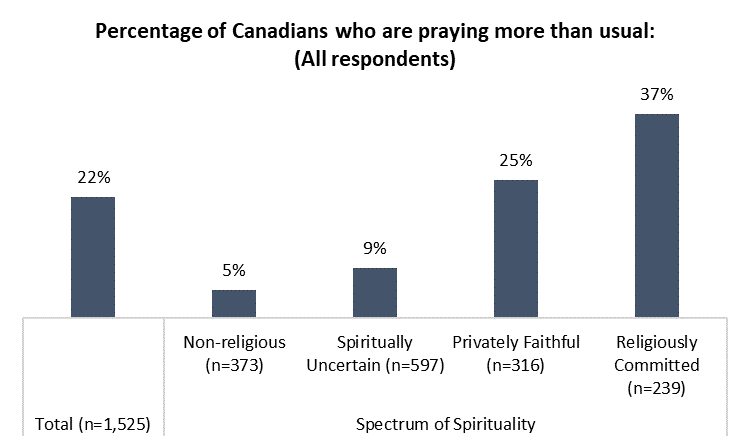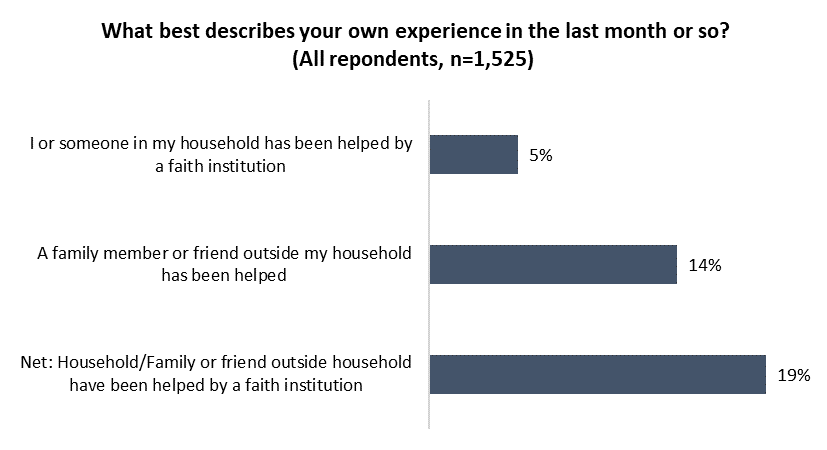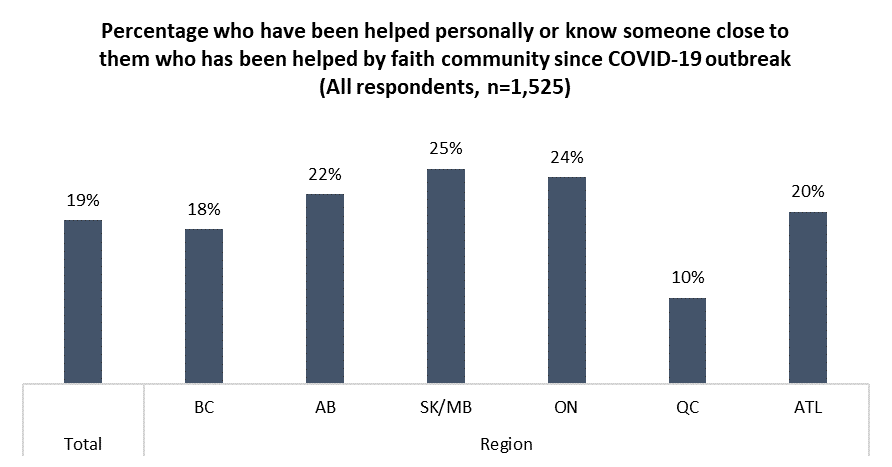Holy Week at Home: Canadians of faith turn to prayer & tech as COVID-19 disrupts Easter and other celebrations
by David Korzinski | April 9, 2020 8:30 pm
Significant segment of Canadians supported by faith communities since COVID-19 outbreak began
April 10, 2020 – Canada’s Catholics will not participate in the Way of the Cross processions this spring. For many elderly Jews, Pesach likely meant being alone, for the Sedar. Muslims face eating suhoor and iftar (the two main daily meals served during Ramadan) at home without visitors, instead of at their local mosque.
As Canadians of several faiths prepare to observe and celebrate some of the holiest days on their religious calendars, COVID-19 has upended the traditional and long-held community-based celebrations and observances that strengthen them – and their spiritual beliefs. With special Masses cancelled, and the doors to houses of worship locked, how are Canadians of faith planning to mark these most sacred periods? And how is their faith helping them through these unprecedented and frightening times?
The non-profit Angus Reid Institute, in partnership with Cardus[1], set out to answer these questions – and measure the extent to which all Canadians have been assisted by faith institutions during this time – in this most recent public opinion survey. The data find Canadians who identify as religious increasingly turning to prayer and scripture for comfort – and to technology for celebration and sermon – as they navigate through these times of self-isolation.
More Key Findings:
- One-in-five Canadians say they personally or someone close to them have been supported by a faith institution since the coronavirus began spreading in Canadian communities
- Among Canadians who pray (59% of the population overall), more than one-in-five say they are turning to prayer more since the COVID-19 pandemic gripped the country
- For those more steeped in faith – prayer has been an important source of relief and comfort in dealing with feelings of isolation, depression and uncertainty
- It’s technology to the rescue for many Canadians looking to observe religious services while staying at home: online mass, Zoom prayer sessions and religious apps are among the most popular
About ARI
The Angus Reid Institute (ARI) was founded in October 2014 by pollster and sociologist, Dr. Angus Reid. ARI is a national, not-for-profit, non-partisan public opinion research foundation established to advance education by commissioning, conducting and disseminating to the public accessible and impartial statistical data, research and policy analysis on economics, political science, philanthropy, public administration, domestic and international affairs and other socio-economic issues of importance to Canada and its world.
INDEX:
Part One: For the faithful, prayer more important than ever
-
Among those who pray, women leaning on faith more than men
-
Prayer a huge help for those relying on it to overcome anxiety, loneliness
Part Two: Holy Week at Home
-
Technology helping to facilitate observance
Part Three: Community Support and Faith Institutions
Part One: For the faithful, prayer more important than ever
In times of crisis, frustration and trial, many Canadians turn to faith for comfort or support. With the COVID-19 outbreak threatening the health and financial wellbeing of residents from coast to coast, it is perhaps unsurprising that many Canadians have turned to a higher power a little more often than they normally would.
One-in-five Canadians who pray (59% of the population overall) say they have been praying more often than normal:

Among those who pray, women leaning on faith more than men
Notably, it is not necessarily generational differences that drive the increase in religious observance. One may expect that it would be, given older Canadians higher propensity to follow faith (see detailed tables[2]).
Among those who pray, it is, in fact, gender that is more likely to delineate who is praying more. Women of all age groups are considerably more likely than their male counterparts to strengthen their practice of prayer.

In order to better understand these societal effects from the COVID-19 outbreak, it is of value to analyze the data via the Spectrum of Spirituality. This spectrum was created by the Angus Reid Institute and has been utilized in several reports to better understand and describe how Canadians relate to faith. For a detailed description of the Spectrum and its methodology, please view the notes at the end of this report.
Those who are Religiously Committed are leaning more heavily on their religious foundation than others. One-quarter of the Privately Faithful are too praying more than usual:

Prayer a huge help for those relying on it to overcome anxiety, loneliness
Whether they’re praying more, or the same amount, those who have a deep religious faith are near unanimous in saying that this discipline has helped them overcome COVID-19 driven fear and anxiety. Nearly all of those in the Religiously Committed group say this, and note too that prayer has helped alleviate feelings of loneliness and depression. Approximately three-quarters of the Privately Faithful say that they have been aided with such feelings, as well:

Part Two: Holy Week at Home
Upcoming religious celebrations of other faiths will also be impacted by the COVID-19 outbreak, including, for instance, the cancellation of the annual Vaisakhi Parade[3] in Surrey, B.C., the largest outside of India. (Because relatively small percentages of population preclude drawing representative samples among certain religious groups, data for these groups are not included in this study.)
For the faithful, this is an unprecedented time for religious celebrations. Among those who identify as Christian, Jewish or Muslim in this country, preparing to celebrate Easter, Passover and Ramadan, the vast majority say this holy period will be as meaningful as it usually is, despite the unusual circumstances.
For another quarter, however, this year is taking on equal parts more (13%) and less (13%) meaning, as they adjust their plans and avoid public events:

Technology helping to facilitate observance
So how then, will religious Canadians be observing this period? Those who identify with the three main monotheistic religions for whom major spiritual events loom are most likely to say this will be a period of praying at home and reading scripture.
It is 2020, however, and reliance on technology extends well past streaming movies, working from home and ordering groceries. Many also say they will be relying on technology to connect with their faith community for a service online, while others will be praying with friends and family over a video chat or using an app to seek meditation or guidance.

Part Three: Community Support and Faith Institutions
Previous polling conducted by ARI earlier this month reported that one-quarter of Canadians (27%) say they are in bad or terrible shape financially. In some cases, this has meant looking to friends, family or a food bank for help, while in others, Canadians have turned to faith communities for help.
Related: COVID-19: Canadians near-unanimous in expectations of economic woe as pandemic enters second month[4]
Indeed, one-in-five (19%) say someone in their household or a friend or family member outside of their household has received assistance from a faith institution within the last month. This includes things like distributing food, helping with groceries or other errands, or checking up on those home alone:

The proportion of Canadians who have been helped by a faith community rises to one-quarter in the Prairies and in Ontario:

Notes on Methodology:
In order to situate faith in Canada, a number of important elements need to be considered. How intensely does one believe? Do they engage with religion regularly? Do they read holy scripture? With the spectrum of spiritual belief and practice in mind, Angus Reid Institute researchers created a composite index based on responses to several questions about faith and experience with God or a higher power.
This enabled researchers to group respondents into like-minded segments. The following factors were included in the data analysis:
- Belief in God or a higher power
- Belief in life after death
- How often, if at all, a person prays to God or a higher power
- How often a person attends religious services
- How often a person reads the Bible or other sacred text
- How often a person feels they experience God’s presence
ARI researchers used respondents’ answers to these questions to create a continuum of faith, with those providing more answers indicating belief near the high end, and those with fewer answers suggesting a degree of personal faith near the low end.
Along this continuum, four distinct groups emerge:
- Non-Believers
- The Spiritually Uncertain,
- The Privately Faithful
- The Religiously Committed
To read more analysis of the Spectrum of Spirituality, view release here.[5]
For detailed results by age, gender, region, education, and other demographics, click here.[6]
For detailed results by the Spectrum of Spirituality, click here.[7]
To read the full report, including detailed tables and methodology, click here.[8]
For full questionnaire, click here.[9]
Image – Debby Hudson/Unsplash
MEDIA CONTACTS:
Shachi Kurl, Angus Reid Institute: 604.908.1693 shachi.kurl@angusreid.org[10] @shachikurl
Ray Pennings, Cardus: 613.627.4396 rpennings@cardus.ca[11] @rpennings
- in partnership with Cardus: https://www.cardus.ca/
- see detailed tables: http://angusreid.org/wp-content/uploads/2020/04/2020.04.10_COVID_Faith_PRTables_Demos.pdf
- Vaisakhi Parade: https://globalnews.ca/news/6667800/surrey-vaisakhi-parade-cancelled-to-stop-coronavirus-spread/
- Related: COVID-19: Canadians near-unanimous in expectations of economic woe as pandemic enters second month: http://angusreid.org/covid-19-canadians-expect-worse/
- view release here.: http://angusreid.org/religion-in-canada-150/
- click here.: http://angusreid.org/wp-content/uploads/2020/04/2020.04.10_COVID_Faith_PRTables_Demos.pdf
- click here.: http://angusreid.org/wp-content/uploads/2020/04/2020.04.10_COVID_Faith_PRTables_Spirituality.pdf
- click here.: http://angusreid.org/wp-content/uploads/2020/04/2020.04.10_COVID_Faith.pdf
- click here.: http://angusreid.org/wp-content/uploads/2020/04/2020.04.10_COVID_Faith_Qnaire.pdf
- shachi.kurl@angusreid.org: mailto:shachi.kurl@angusreid.org
- rpennings@cardus.ca: mailto:rpennings@cardus.ca
Source URL: https://angusreid.org/covid-religion-easter/